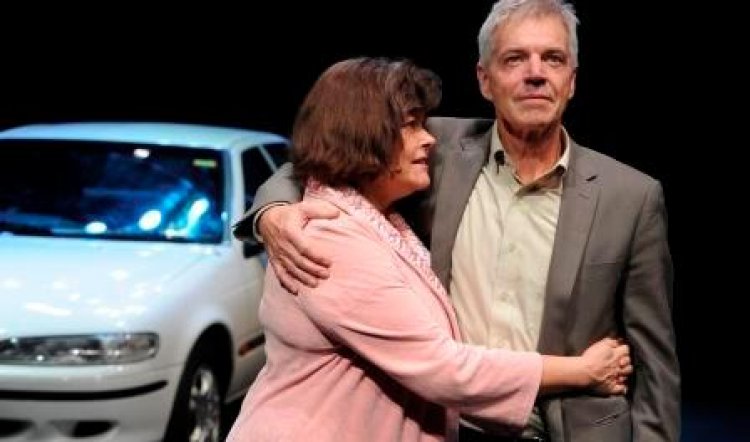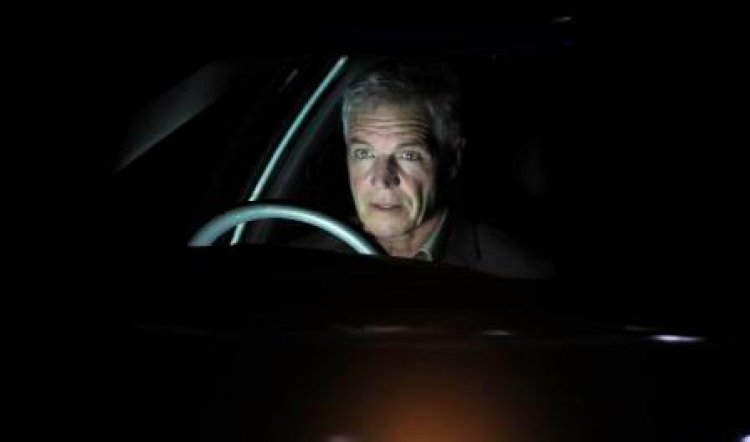
DEATH OF A SALESMAN
DEATH OF A SALESMAN, Belvoir St Theatre; 27 June-19 August 2012. Photos by Heidrun Lohr: Genevieve Lemon and Colin Friels;
For a work that bears the burden of "greatest play of the 20th century" - and which burden is rarely prefixed with "arguably" - Arthur Miller's marvellous play is a lithesome thing. More than 60 years after its first staging it speaks to audiences as clearly as it did in 1949. Its characters - the Loman family - are vivid and credible in 2012, as babyboomers face the spectre of the scrapheap and everyone else is reading daily of lay-offs and closures and businesses in strife. The tragedy of Willy Loman - the salesman who can no longer sell - and his long-suffering wife Linda, who scrapes and scrimps to pay the mortgage and keep them and their boys - is instantly recognisable.
Also recognisable, in an era of professional bullshit and baloney, is Willy's simple inability to tell a straight line or 'fess up to failure or setbacks. His tragedy is made up of such petty flaws it's painful to observe as he flounders and blunders his way to oblivion. Broadway's first Salesman was Lee J Cobb; he was followed by Brian Dennehy and later, by George C Scott. These three are almost absurdly masculine in their overbearing physicality and their readings of the role have stuck in popular memory as the quintessential Willy Loman: bullying but ultimately weak. (Whereas the shrewish Dustin Hoffman, in the 1985 TV movie version, was simply mean.)
So, what's particularly interesting and emotionally engaging in this new production is director Simon Stone's casting of Colin Friels in the title role. Like the actors mentioned above, Friels brings his own image baggage to the stage, but that's where any similarity ends. His place in Australian screen history is indelible through the gentle junkie Javo in Monkey Grip and then the gentle bank robber Malcolm. These wide-eyed, dimple-cheeked, unlikely charmers are lodged in the DNA of Australia's popular culture despite his many tougher roles in recent years, while his stage appearances have been rare.
Friels is an irresistible presence although he isn't an overly tall or physically imposing man and there is nothing of the predictable original characterisation in his Willy Loman. Instead of bombast there is charm and blarney and that makes his cruel delusions and deluded cruelty even more powerful. The consequence is a three-dimensional man of many shades of grey, light and shade, good and bad, kindness and foolishness, pride and shame. His sons miraculously mirror him - Biff has his determined manliness while Happy is all feckless sweet-talk; meanwhile Linda does the best she can to cope with the repercussions.
When the play opens, Loman is no longer coping with his life as a travelling salesman and Linda has discovered evidence that he intends to kill himself. His sons are exasperated with him and respect has dribbled away. His life on the road includes a luscious popsy (Blazey Best) on whom he lavishes silk stockings while Linda is at home darning hers - adding to his shame and rage. Willy is now haunted by the past - his glory days as well as his dead brother (Steve Le Marquand) - and it is a more appealing place than his humiliating present. When he is fired by the son of the man for whom he has schlepped for thirty years, it's all too much.
Grandeur and heroism are absent from this dark side of the American Dream. Instead there is poignancy and honesty - all emanating from the man who simply can't be honest either with himself or his loved ones. While its language and place are vividly of post-war USA there is a painful universality about Willy's plight that continues to resonate and probably always will. And it makes sense of Simon Stone's decision to have his actors speak in their natural Australian voices. At first this is distracting - as they speak of Yonkers, Brooklyn, Boston and so on - but no more so than when an audience is inevitably listening for the slips and slides of insecurely assumed accents. Within minutes the commonality of the piece has dominion and the characters and their lives are all that matter.

The action takes place in a black void in which sits a white Ford Falcoln (designer Ralph Myers). the vehicle is Willy's pride and joy and also the tomb in which his dreams are dying. It's an effective device - the family outing, the boys as young men lairing around - but it's also a bit of a trap (Blazey Best climbs out of its boot in an entrance that shouldn't be comical). Like the Aussie accents, however, the car tends to fade into the background as the dazzling power of the script and the actors take over.
While Colin Friels rightly dominates the stage, the company is tremendous. Patrick Brammall is a wondrous foil and antagonist as elder son Biff, while Hamish Michael is all slack-jawed wheedling as younger brother Happy. Pip Miller and Luke Mullins round out the cast that also brings the tremendous Genevieve Lemon back to Australia after starring in London in Billy Elliot. Her Linda is a tragically beautiful creation but made lesser through being short-changed by this production's one major flaw.
While Willy Loman rules the stage, Linda's resilience and survival are the emotional and moral balance that makes his bull-headed determination to succeed/fail so mesmerising to watch. She has the last words, at his graveside, and they make terrible sense of all that has gone before. In this production the speech has been cut and she is a disembodied voice from off-stage calling "Willy!" as the salesman dies centre-stage in his silly car. It's made into a scene of bathos rather than pathos and is a great pity. This is how it should end...
Linda: "Forgive me dear. I can't cry. I don't know what it is. I cant cry. I don't understand it. Why did you ever do that? Help me Willy, I can't cry. It seems to me that you're just on another trip. I keep expecting you. Willy, dear, I can't cry. Why did you do it? I search and search and I search, and I can't understand it, Willy. I made the last payment on the house today. Today, dear. And there'll be nobody home. We're free and clear. We're free."


-c444x300.jpeg)
